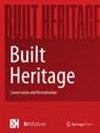Assessing the performance of urban heritage conservation projects – influencing factors, aspects and priority weights
Q1 Arts and Humanities
引用次数: 0
Abstract
Heritage conservation in urban areas involves complex systems often faced with the dilemmas of maintaining the built form’s historical character, improving infrastructure, and managing development through stakeholder cooperation. At present, the performance of any conservation project is solely vested in conserving the built fabric. Evaluation tools for urban heritage conservation projects do not have provisions for measuring the subjective value of stakeholders who are part of the heritage setting. This study tries to identify and prioritise the factors that need to be considered when developing a conservation project performance assessment model for an urban heritage conservation project from the perspective of experts that can be further evaluated from the perspective of stakeholders. As these complex systems can be better viewed in the context of developing countries, the case of India is adopted. From a literature review, factors that contribute to the outcome of an urban heritage conservation project were identified and categorised into six aspects: the physical, social, economic, cultural, political, and continuity aspects. Through an expert survey, the factors that constituted each aspect were filtered using the feature selection method of correlation to avoid factors that may seem related. The factors under each aspect were ranked using a weighted average ranking method to identify the most prioritised factors determining the outcome of an urban heritage conservation project. The priority weights of the aspects were calculated using Saaty’s analytic hierarchy process. The results show that the cultural aspect was the most important aspect, followed by the continuity aspect. The social and physical aspects were prioritised similarly, followed by the economic and political aspects. This study is distinctive because it identifies the influential factors that can help develop a conservation project performance assessment model for an urban heritage conservation project.评估城市遗产保护项目的绩效--影响因素、方面和优先权重
城市地区的遗产保护涉及复杂的系统,往往面临着既要保持建筑形式的历史特征,又要改善基础设施,还要通过利益相关者的合作来管理发展的两难境地。目前,任何保护项目的绩效都只取决于对建筑结构的保护。城市遗产保护项目的评估工具中没有衡量遗产环境中利益相关者主观价值的规定。本研究试图从专家的角度为城市遗产保护项目开发一个保护项目绩效评估模型,并从利益相关者的角度对其进行进一步评估。由于从发展中国家的角度可以更好地审视这些复杂的系统,因此采用了印度的案例。通过文献综述,确定了影响城市遗产保护项目成果的因素,并将其分为六个方面:物质、社会、经济、文化、政治和连续性。通过专家调查,利用相关性特征选择法对构成各方面的因素进行了筛选,以避免出现看似相关的因素。采用加权平均排序法对每个方面的因素进行排序,以确定决定城市遗产保护项目结果的最优先因素。各方面的优先权重是通过萨蒂层次分析法计算得出的。结果表明,文化是最重要的因素,其次是连续性。社会和物质方面的优先权相似,其次是经济和政治方面。这项研究的独特之处在于,它确定了有助于为城市遗产保护项目开发保护项目绩效评估模型的影响因素。
本文章由计算机程序翻译,如有差异,请以英文原文为准。
求助全文
约1分钟内获得全文
求助全文

 求助内容:
求助内容: 应助结果提醒方式:
应助结果提醒方式:


